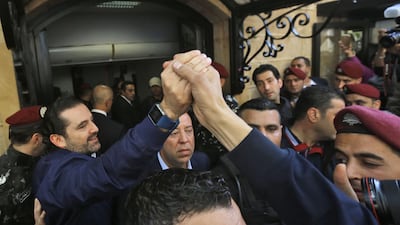Lebanese prime minister Saad Hariri said that the Syrian regime, which he blames for the 2005 assassination of his father, former premier Rafik Hariri, wants him dead.
"I have a lot of enemies, extremists and the Syrian regime. The latter has issued a death sentence against me. They accuse me of interference in their country," Mr Hariri, who was interviewed at his Beirut residence, told French magazine Paris Match in an interview published on Thursday.
However, despite death threats, Mr Hariri said that he was willing to withdraw his resignation he tendered on November 4 if the situation in the country remained “positive”.
Mr Hariri suspended his resignation, announced from Riyadh at the request of Lebanese president Michel Aoun and returned to Beirut after a three-week absence.
He said in the interview that he could continue as prime minister “as if nothing had happened”, and characterised his shock resignation as a message to the Iran-backed Lebanese group, Hizbollah.
He cited Tehran’s “grip” on his country through Hizbollah and threats to his life as causes of his resignation.
Mr Hariri tweeted on Wednesday night: “Things are positive, as you’ve heard. If this positivity continues, we are, God willing, going to inform Lebanese next week with his excellency president Michel Aoun and parliament speaker Nabih Berri the withdrawal of the resignation.”
The activity of Hizbollah — which is part of the Lebanese government — in the region has created tension with Saudi Arabia, which backs rebel factions in Syria that sought to overthrow the government of president Bashar Al Assad — an ally of Iran.
Saudi Arabia has also accused Hizbollah of intervening on behalf of Houthi rebels in Yemen fighting a Saudi-backed coalition, which includes the UAE. Despite a Saudi-led military intervention launched in March 2015, the capital Sanaa and much of north of the country remain in the hands of the Houthi rebels.
Mr Hariri, who holds both Saudi and Lebanese citizenships, again denied reports that he was in the kingdom under house arrest.
"I wanted the world to understand that Lebanon can no longer tolerate the interferences of a party like Hizbollah in the affairs of the Gulf countries, where 300,000 Lebanese live," he told Paris Match. "They are very important to our economy. We must not pay for the actions of Hizbollah."
The US has threatened to tighten already existing economic sanctions against Hizbollah, and the tensions have raised fears the Saudis could take similar moves.
Mr Hariri this year has sought assurances from the US that new sanctions against Hizbollah would not hurt the Lebanese economy as a whole.
“I fear that Hizbollah's interference abroad will end up costing Lebanon dearly,” he said. “I will not accept that a Lebanese political party participates in maneuvers that serve the interests of Iran.”
In an interview published on Wednesday, Mr Aoun told Italian newspaper La Stampa that Hizbollah's fighters in Syria would return to Lebanon when the war — now in its sixth year — ended.
“Hizbollah has fought against Islamic State terrorists in Lebanon and abroad. But when the war against terrorism is finished, their fighters will come back to the country,” the Lebanese president was quoted as saying.
Hizbollah leader Hassan Nasrallah said last week that the group’s fighters would also end their involvement in Iraq, where they have aided the Iraqi government in its fight against ISIL, a battle that now appears largely over.
In the Paris Match interview, Mr Hariri took a conciliatory line towards Hizbollah, the only political party to maintain a militia following the end of the country's civil war more than 25 years ago.
While the party maintains that the weapons are to deter Israel from attacking Lebanon, Hizbollah conducted military operations inside Lebanon earlier this year against Al Qaeda-affiliated militants in the northern part of the country. It also deployed fighters in Beirut almost 10 years ago during an internal political crisis in the country.
"We have to make a distinction. In Lebanon, Hizbollah has a political role," Mr Hariri said. "Lebanon's interest is to ensure that these weapons are not used elsewhere. That is where the problem comes from."
Mr Hariri’s resignation initially led to fears that Lebanon could be plunged into economic and political turmoil, a new round of sectarian violence or even a war between Israel and Hizbollah, whose 2006 conflict devastated the country.
Instead, Mr Hariri’s announcement created a rare moment of relative political consensus in Lebanon, with the country’s factions all calling for Mr Hariri’s swift return.
Mr Hariri’s election as prime minister late last year ended nearly two years without a government and marked a detente between Mr Hariri’s Future Movement and Hizbollah, whose rivalry has largely determined the course of Lebanese politics over the past decade.
*Additional reporting by the Agence France-Presse, Associated Press and Reuters

